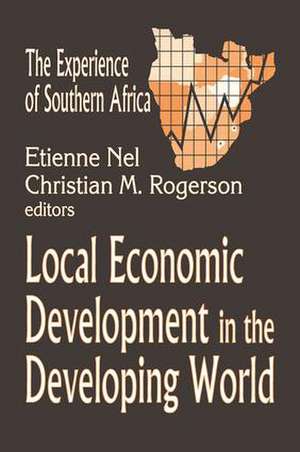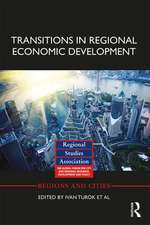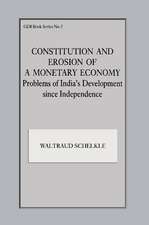Local Economic Development in the Changing World: The Experience of Southern Africa
Autor Christian Rogersonen Limba Engleză Paperback – 5 feb 2018
This volume examines the debates about Local Economic Development and examines some of the unfolding experiences of LED in the developing world. The focus is upon the region of southern Africa, and more especially upon post-apartheid South Africa. LED emerged in South Africa as one of the more significant post-apartheid development options being pursued by empowered localities with the overt encouragement of national government. Elsewhere in the developing world, much interest surrounds the experience of LED in post-apartheid South Africa, which is seen as a laboratory for experimentation, innovation, and learning. The seventeen chapters in this book examine the range of LED interventions that have been the basis for experimentation in the last decade, including both pro-market as well as pro-poor interventions. Key themes include debates about the most appropriate policy directions for LED, its contribution towards sustainable development, the role of social capital, cluster support, public procurement, eco-development, good governance and tourism-led LED. The book also contains a series of detailed case studies on the implementation of LED in South Africa and the wider region of southern Africa, including analyses of LED undertaken at a variety of scales from the provincial, metropolitan, and small-town level. Until now, most research on local economic development has focused on the developed world.
This volume breaks new ground in applying LED policy and practices to problems specific to the developing world. It will be of interest to scholars of development studies, urban and regional planning, human geography, and urban studies.
Preț: 299.52 lei
Preț vechi: 341.55 lei
-12% Nou
Puncte Express: 449
Preț estimativ în valută:
57.32€ • 59.77$ • 47.64£
57.32€ • 59.77$ • 47.64£
Carte tipărită la comandă
Livrare economică 21 martie-04 aprilie
Preluare comenzi: 021 569.72.76
Specificații
ISBN-13: 9781138511712
ISBN-10: 1138511714
Pagini: 366
Dimensiuni: 152 x 229 mm
Greutate: 0.45 kg
Ediția:1
Editura: Taylor & Francis
Colecția Routledge
Locul publicării:Oxford, United Kingdom
ISBN-10: 1138511714
Pagini: 366
Dimensiuni: 152 x 229 mm
Greutate: 0.45 kg
Ediția:1
Editura: Taylor & Francis
Colecția Routledge
Locul publicării:Oxford, United Kingdom
Cuprins
1: Setting the Scene: Local Economic Development in Southern Africa; 2: Contextualizing South African Local Economic Development within Current Development Debates: The International Setting; 3: Putting “Developmental Local Government” into Practice: The Experience of South Africa’s Towns and Cities; 4: Debates in Local Economic Development Policy and Practice; 5: Towards Pro-Poor Local Economic Development: The Case for Sectoral Targeting in South Africa; 6: Pro-Poor Local Economic Development in South Africa: The Application of Public Procurement; 7: Local Economic Development in South Africa: A Useful Tool for Sustainable Development; 8: Social Capital and Appropriate Skills Training as Prerequisites for Successful Local Economic Development: The Noordhoek Valley Training Centre, Cape Town; 9: Inner-City Economic Revitalization Through Cluster Support: The Johannesburg Clothing Industry; 10: From Spatial Development Initiative to Blue IQ: Sub-National Economic Planning in Gauteng; 11: Durban’s Pursuit of Economic Development in the Post-Apartheid Era; 12: Local Economic Development in Midrand, South Africa’s Ecocity; 13: Local Economic Development in South African Small Towns; 14: The Local Development Impacts of Backpacker Tourism: Evidence from the South African Experience; 15: Tourism-Led Local Economic Development: The South African Experience; 16: Local Economic Development in Swaziland: The Case of Manzini City; 17: Policy Options for Good Governance and Local Economic Development in Eastern and Southern Africa
Descriere
Over the last two decades the concept and practice of Local Economic Development (LED) has gained widespread acceptance around the world as a locally-based response to the challenges posed by globalization, devolution, local-level opportunities, and economic crises




















